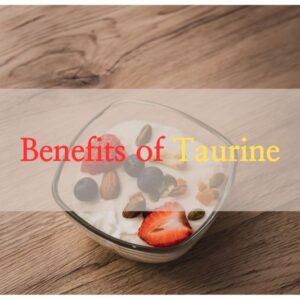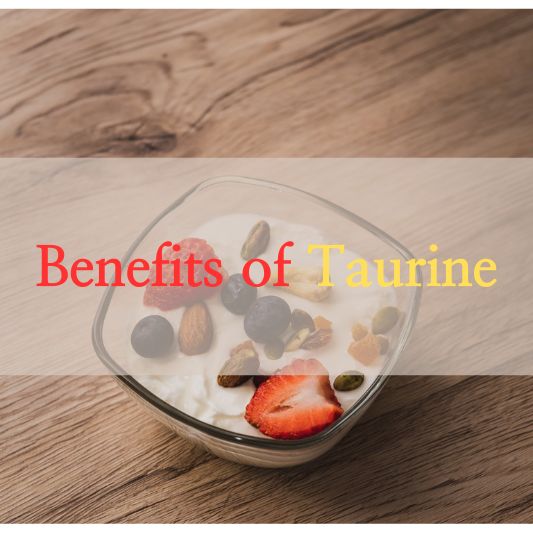Taurine, an amino acid, is one of the essential compounds in our bodies that performs various crucial functions. In this article, we will delve into the various benefits of taurine and where you can obtain it from in your diet. While taurine is often associated with energy drinks, its benefits extend beyond just that.

Benefits of Taurine
Energy and Endurance Enhancement:
Taurine can promote energy production and muscle function, which may help improve exercise performance and stamina.
Stress Management:
Taurine is believed to have a calming effect on the nervous system, potentially reducing stress and anxiety.
Eye Health Improvement:
Taurine may have a positive impact on eye health by supporting the structure and function of the retina.
Antioxidant Function:
Acting as an antioxidant, taurine can reduce cell damage and help prevent age-related effects.
Cardiovascular Health:
Taurine can help regulate blood pressure and promote blood vessel dilation, contributing to cardiovascular health.
Diabetes Prevention:
Taurine may aid in blood sugar control and reduce the risk of diabetes.
Immune System Support:
Taurine can strengthen the immune system and enhance immune function.
Brain Function Enhancement:
Some research suggests that taurine may improve brain function, enhancing learning and memory capabilities.
Taurine-Containing Foods
Meat:
Meat, especially beef and pork, is a significant source of taurine.
Seafood:
Seafood like squid, clams, and mussels is rich in taurine.
Poultry:
Chicken meat, particularly chicken breast, contains substantial amounts of taurine.
Dairy Products:
Some dairy products, such as milk and cheese, contain small amounts of taurine.
Energy Drinks and Supplements:
Taurine is commonly added to energy drinks and dietary supplements. Be cautious with these products, as some can contain high concentrations of taurine.
Conclusion:
Taurine is a versatile amino acid with potential health benefits. It is associated with energy enhancement, stress management, eye health, antioxidant properties, cardiovascular well-being, diabetes prevention, immune system support, and cognitive improvement.
However, it is essential to consume taurine in appropriate quantities and be mindful of the source. Obtaining taurine through natural food sources is generally considered safe, while excessive consumption of supplements or energy drinks can lead to side effects. Adjust your taurine intake according to your health needs, and seek advice from professionals if necessary.
Frequently Asked Questions:
Q1. How does taurine work?
Taurine stabilizes the central nervous system and supports various bodily functions, primarily aiding in energy production and muscle function.
Q2. What is the recommended daily intake of taurine?
There is no official recommended daily intake, but a general guideline suggests a daily intake of taurine between 500 to 2000mg is typically safe.
Q3. Can certain foods help increase taurine intake?
Yes, taurine is commonly found in high-protein foods like meat, seafood, poultry, and some dairy products.
Q4. What precautions should be taken when consuming taurine supplements?
When taking taurine supplements, it’s essential to adhere to recommended dosages and avoid excessive intake. Additionally, consider potential interactions with other medications and consult a healthcare professional if needed.
Q5. Can taurine have side effects?
While moderate taurine consumption is generally safe, excessive intake may lead to side effects such as insomnia, palpitations, and digestive issues. It’s crucial to observe any adverse reactions and adjust your intake accordingly.
Find out the price of Taurin Yarde on iHub!
Find out the effects of Aronia!
